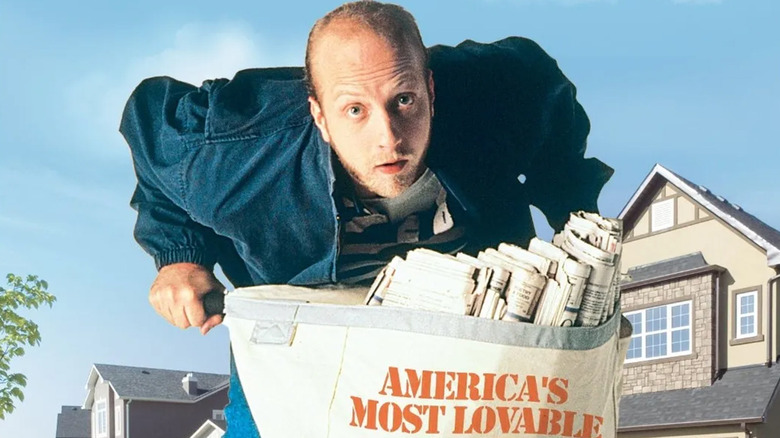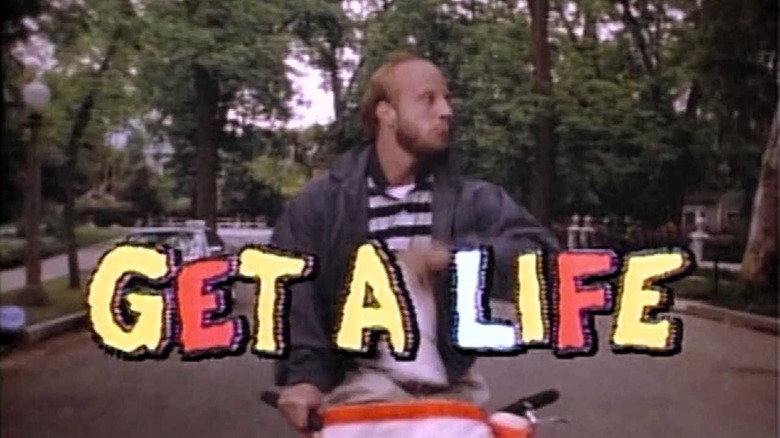Get A Life Was An Under-Appreciated Sitcom That Showed Off Bob Odenkirk's Writing Chops
Here's a TV curio that deserves a second look. Back before Bob Odenkirk became Saul Goodman, before Charlie Kaufman became an Oscar-winning writer/director, and before David Mirkin became showrunner over at "The Simpsons," they all worked together on a little-known show that, honestly, shouldn't have ever made it to air.
"Get A Life" was a short-lived satirical take on the sitcom format starring Chris Elliott as Chris Peterson — a 30-year-old paper boy who still lived with his parents, Gladys and Fred Peterson (Elinor Donahue and Elliott's real-life father, Bob Elliott). The show appeared on Fox and ran from 1990 to 1992 before it was unceremoniously axed by the network. And even though there's a chance you've probably never heard of it, "Get A Life" had a small but significant cult following that persists to this day — mostly due to its often surreal and absurdist humor that made it unlike any other network show at the time. As the Washington Post put it, "Get A Life" set "a glorious new standard in dopey, lowbrow comedy."
So how did a show which had a roster of undeniably talented writers and performers behind it, and which at one point was apparently the highest-rated show on the Fox network, manage to fly so effortlessly under the radar? Well, it's actually a pretty interesting story, so follow along, won't you, as we investigate the bizarre and hilariously upsetting history of "Get A Life"
Chris Peterson was lovably psychotic
The story of how Mirkin and co. got the show to air in the first place is pretty funny in and of itself. Elliott, who had gained recognition for his work on "Late Night with David Letterman" was said to have pitched "Get A Life" as a show in which he would play Dennis the Menace as an adult. But, in reality, he, Mirkin, and the team had much more outlandish plans and over the course of the show's two seasons, things would get downright ridiculous.
In the pilot episode, Chris is written as a much more lucid and, frankly normal, character than he would become. That was, according to Mirkin, by design. Once Fox saw the pilot and ordered it to season, the writing team could make Chris the borderline psychotic figure they'd always envisioned. As Mirkin told Vulture: "[Fox] just wanted him to process reality, which was never going to happen. We had no intention of that happening."
Thus, the first season saw Chris' exploits become increasingly surreal and farcical, to the point that anything, including his own violent death, could and often did happen. Plots involved everything from a clip show where Chris reminisces on the series while falling from a plane and the infamous "Stewey And Me," which is basically a parody of E.T. that culminates in Chris eating his alien friend.
With such an aggressively subversive and surrealist tone, "Get A Life" could have easily come across as off-putting and inaccessible. Which it kind of did. But there was something endearing about Chris Elliott's portrayal of Peterson and the show's attempts at subverting the sitcom format ultimately betrayed an affection for the sitcom tropes of old.
The show benefitted from vintage Bob Odenkirk writing
Odenkirk, who had won an Emmy in 1989 for his writing on "Saturday Night Live," lent his talents to the show by not just being part of the writers' room but by penning two episodes solo. The best one, "Bad Fish," sees Chris convince his friend Larry's ex-wife, Sharon (Robin Riker), and Chris' landlord Gus (Brian Doyle-Murray), that they are in fact his best friends. The pair get amnesia after eating some spoiled shellfish and Chris takes full advantage of the situation, but not before enrolling in college and completing a full degree program just to learn what the word "amnesia" means.
The episode is full of the kind of casually bizarre humor that Odenkirk would later showcase in his and David Cross' seminal HBO sketch series "Mr. Show." In that and many other ways, "Get A Life" was ahead of its time, giving audiences a glimpse at a surrealist brand of comedy that really wasn't getting much mainstream exposure back in the early 90s. In fact, multiple ridiculous moments and lines seem, in retrospect, designed for the internet age in their easy gif and meme-ability. It's for that reason you can find Reddit threads where fans quote their favorite lines and lament the show being as slept on as it was. Elsewhere, on the "Get A Life" DVD collection you'll find comedy legends such as Judd Apatow singing its praises, adding up to an irrefutable legacy as one of the more influential of the overlooked comedies of the '90s.
How did this show last two seasons?
There are only 35 episodes of "Get A Life" but in retrospect, it's pretty amazing that any of them exist. The show was so absurd and stupid yet strangely intelligent that to this day it doesn't really feel like it fits anywhere. Which, to me, feels like its strength. But the fact that Fox let Elliott's psychotic man-baby run amok for two full seasons is incredible. As Elliott recalled in an interview years later:
"[Fox] gave us notes — an incredible amount of notes. On everything. Like I said, it wasn't the show they wanted. Believe it or not, I remember them saying when I was first in talks with them that they were looking for a Cosby kind of show [...] then we gave them this 30-year-old guy living in a garage in his parents' house. But their notes always reflected the fact that they still wanted the show to be grounded in reality."
Considering the end of "Bad Fish" sees Gus and Sharon literally pulling Chris' head off and kicking it around the backyard under a shower of blood, it's not hard to see why the Fox suits, with their expectations of a heartwarming family sitcom, pulled the plug.
Mirkin said he and his team got "about 5,000 letters asking to save the show," when news of its cancellation broke, which wasn't enough to convince the Fox execs to change their minds. But the co-creator isn't bitter about anything and sees the show's infinite elasticity as what made it simultaneously great and an outcast in an era where the formulaic sitcom dominated pop culture: "That's the kind of show I love – the kind where you can go anywhere and do anything."



